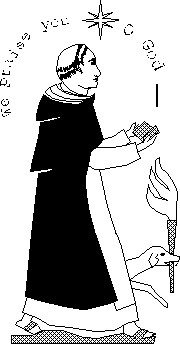THE PSALMS
A special edition of a special book
by
Joseph Kenny
O.P.
INTRODUCTION

The Book of Psalms, together with other Canticles of the Old and New Testament, are the basis of the Liturgy of the Hours, the official prayer book of the Church. The General Introduction to that book explains in detail theology and directions for celebration of this prayer.
We only need a word about what is special about this edition:
First, the translation is based on the research of Mitchel Dahood, published in the Anchor Bible and my further application of his interpretative principles. This gives a different meaning from other translations for many passages, and clears up many obscurities of the Hebrew that other translations could not satisfactorily render. I try, with Dahood, to retain the poetic imagery and word play of the Hebrew. This is different from several imaginative modern translations which have beautiful English style, but are only paraphrases of the original.
Secondly, a stylistic feature of Semitic literature (Biblical poetry and the Qur’ân) is a symmetry of parts that repeat, contrast with, or complement one another. This was long recognized within Psalm verses, but the layout of this translation shows that symmetry on the level of the whole Psalm. Usually the central line or lines of the Psalm express its focal point. This is framed by several levels of parallel lines. While each Psalm has a linear logic of thought from beginning to end, there is at the same time another chiastic logic whereby the lines of the same level of indentation are related to one another. This symmetrical layout shows the rationale of the arrangement of ideas, which can seem chaotic in other translations.
This arrangement, of course, demands the retention of the “cursing verses” omitted in the Liturgy of the hours.
The vocabulary of the Psalms
This translation brings out an extraordinary number of names or titles of God. There are as many titles of God in this book as there are Psalms. Try to list them. A few are kept in their original Hebrew form. Yahweh, “I am who am”, is the name given to Moses (Ex 3:13-15).This name is often shortened to Yah, especially in “Hallelu-Yah” = “Praise Yahweh”. The title Yaweh of Armies is a translation of “Yahweh Sabaoth”. Another name is El (pronounced “Ail”), a short name for God which more often apears in the plural of majesty, “Elohim” and is related to the Arabic “Allah”. Another name is Shaddai, meaning “The One who holds strong”.
The Psalmist frequently calls on gods, spirits and divinities to praise God. This is to show that God is the master of whatever other spirits or so-called gods may exist. We may understand them also as angels who, like man, are made in the image of God and participate in his nature (cf. 2 Peter 1:4).
There is no name directly referring to the devil or Satan. The word “serpent” in Psalm 68 is equivalent to the mythological monster Leviathan or Rahab, and in the context is applied to Egypt. Another mythological monster is Tannin (Ps 74). There are many references to human enemies or slanderers, but a special enemy is death personified. This has many names (capitalized for clarity): Death, the Killer, Foe, Enemy, Adversary, Mocker, Wicked One, Devourer.
Sheol is the place of the dead. Another Hebrew word for it is Abaddon (Ps 88; cf. Rev 9:11), meaning a place of perdition. This was the temporary abode of the just until the coming of Christ who descended there and brought them up with him to heaven. It was not viewed as a place of happiness, and for the unjust it was a permanent hell. It is located in the underworld, a word which sometimes means Sheol and sometimes is just a geographical reference, a part of the universe which is all subject to God. Other names for Sheol are: the Pit, Mud, Mire, Slime, Swamp, Deep Waters, Cemetery, Grave, Secret Place, Wasteland, House Below, Land of Descent, Land of Perdition, Land of Forgetfulness, City of Phantoms, Exile, Banishment, Confinement, the Fortress, Dragnet, Darkness, Calamity, Terrors, Desolation, Tent of the Wicked One, Abode of the Foe.
Heaven is sometimes referred to as a Lofty Mountain (Ps 61), Blooming Field (Ps 97), the Plain or the Land (Ps 67), a Meadow or Paradise (Ps 5), Field of Life (Ps 56, 116), or Garden (Ps 36).
In Psalm 110, Melchizedek is translated as “rightful king”.